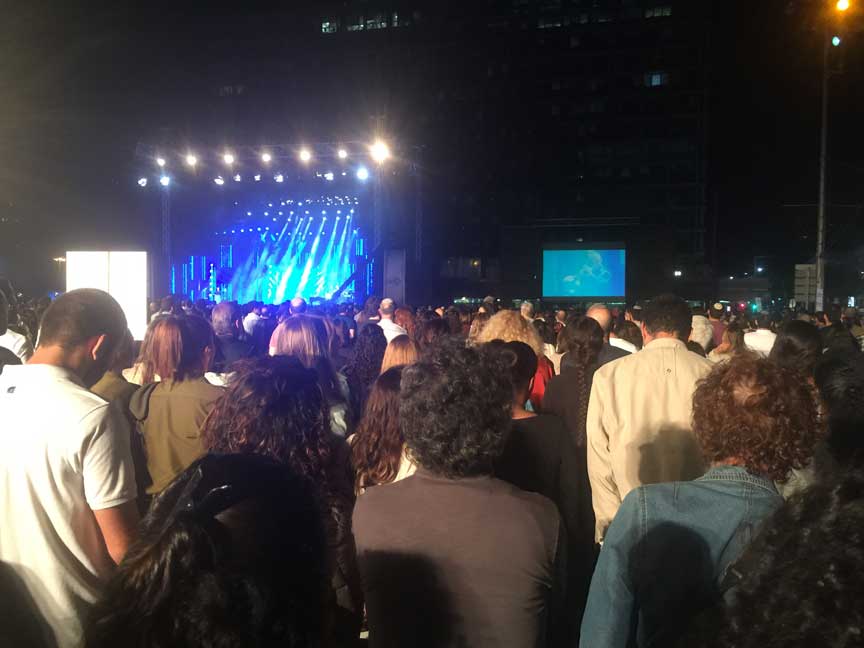5/11/2016 Israel Memorial Day 2016
If Tel Aviv has one truly religious holiday, it's Yom HaZikaron (Israeli’s Memorial Day.) Last night 20,000 people packed Rabin Square, (the place Prime Minister Yitzhak Rabin was assassinated after participating in a Peace Rally 20 years ago) for the yearly memorial to those who died in Israel’s war and terror attacks. The commemoration begins with a wail of sirens that blast their eerie howl through out the country, and bring a nation to a complete and sudden halt.
From the public square in Tel Aviv the thousands gathered watch together the official ceremony that takes place at the Western Wall in Jerusalem. President Rivlin, who opened the tribute there, spoke for all Israelis when he lamented that last year when he delivered his memorial message he dreamed that when he would be called upon to speak again the following year, no new names would have joined the ranks of the fallen. Sorrowfully, that was not to be, as 68 additional souls were lost this year.
When the Jerusalem ceremony ended the eyes of the nation turned to Tel Aviv, as the sea of those gathered in the square participate in a uniquely Israeli memorial service; where popular Israeli musicians lead the crowd in the communal singing of well-known somber, mournful songs in memory of the fallen. Interspersed between the songs the stories of those who have died are shared on large screens across the square. These tragic accounts are usually told through the eyes of the surviving parents, siblings, or spouse.
In total, Israelis remember the 23,447 fellow countryman who were killed in war or at the hands of terrorists. During this year’s ceremony Tel Aviv Mayor, Ron Huldai did something he has never done before. For the first time, the Mayor spoke about his personal loss. Huldai was the deputy commander of one of Israel’s fighter-bomber squadrons during the Yom Kippur War; his was the squadron that suffered the largest number of casualties – with seven pilots killed and 14 captured. Huldai read the names of those killed from his squadron. He continued, recounting the story of one of his comrades. Huldai added the sad fact that a nephew named after one of his men who had been shot down also died while serving in the army. Huldai called the travails of this family “a very Israeli story”.
The event in Rabin Square is always profoundly moving. As the stories of the fallen were shared I glanced around at the gathered mass, and it was hard to see a dry eye. Possibly the most poignant story was told by the father of Bedouin soldier who was an officer in the army. He shared the last conversations with his son, who was planning to get married soon. The night before his death, his son asked if he (the father) had taken care of all he had promised for the wedding. The father replied that he had ordered everything, except for the chairs and the tables. The son asked his father to make sure he orders the chairs. The next morning the dad dutifully ordered the chairs, which were not used for his son’s wedding, but rather for the ceremony to mourn his death. There was an audible gasp in the crowd as the father uttered those words.
I realized sitting amongst the crowd that – almost without exception – everyone there had either been in the army recently or had a son or daughter who had served. When a recent survey questioned in which institution you have the most trust, Israelis overwhelmingly answered – the army. Israelis place their uttermost trust in the army because to most people here, the army is them or their children.
During the day today the country came to a halt once again at 11:00 AM, as the sirens once again wailed and memorial ceremonies begin in all the many military cemeteries that dot the country.
Tonight as the sun goes down, in another uniquely Israeli custom, the weighty solemnity of a day of mourning transforms in almost an instant to the celebration of independence. A week that began with a day in commemorating the Holocaust and its six million Jewish victims; a week in which the memories of those who died in Israel’s wars are honored for their sacrifices will come to an end in one giant celebration.
When the festivities die down, and a new work week starts on Sunday, the political and religious divisiveness that plagues Israel today, will return. Israelis will once again argue about the rights of the Palestinians, the rule of law for the Settlers, or what the just sentence should be for the soldier who killed a neutralized Palestinian attacker. In the meantime most Israelis are united in both their grief and pride – i.e. grief for the price it has taken to remain free; pride in the fact that a country of 600,000 in 1948, to a one of 8.5 million today. There is infinite sadness that so many on both sides of the conflict have died, coupled with pride at the groundbreaking accomplishments of a country made up almost entirely of immigrants, with no natural resources. There is heartache that for many there is no clear path to ending our conflict with the Palestinians, along with satisfaction that – despite it all – we have a democratic society; albeit one that is challenged. For the remainder of today Israelis remember the past, once the sun sets, they will celebrate the present and hope for brighter, peaceful future.

 >
>